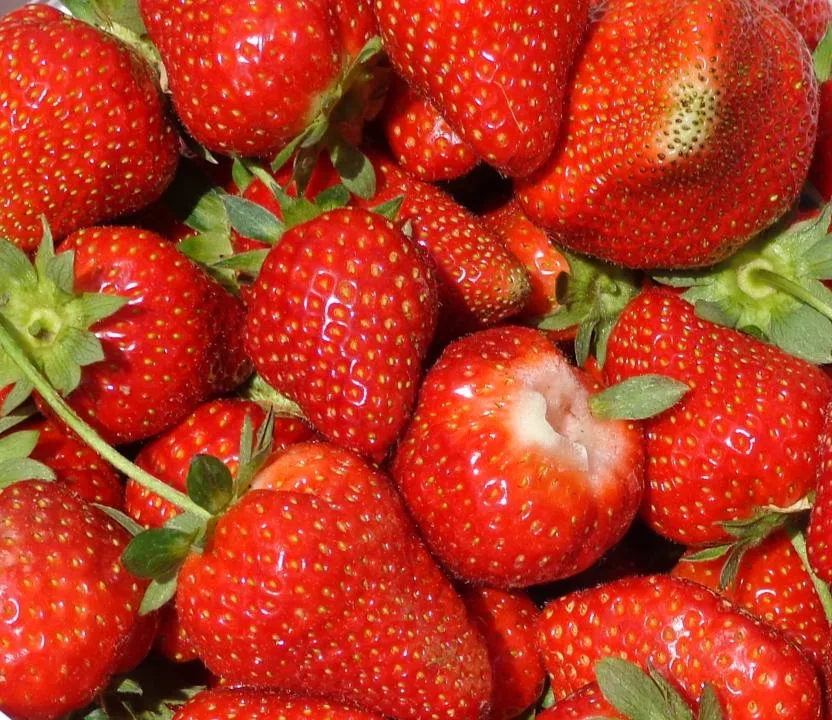Welcome to the world of berries! These small but powerful fruits have become darlings of the health and wellness community in recent years. With their dazzling colors, juicy texture, and sweet-tart flavor, it’s easy to see why berries have captured our attention. But the intrigue goes far beyond taste and aesthetics. Emerging research suggests that berries may offer remarkable benefits when it comes to weight loss and overall health.
This blog post provides an in-depth look at the weight loss prowess found within these petite packages. We’ll explore the nutrient composition of berries, their impact on metabolism and satiety, creative ways to incorporate them into your diet, and their protective effects against chronic disease. By the end, you’ll have a newfound appreciation for berries and be inspired to make them a regular part of your weight loss regimen. So let’s dive right in!
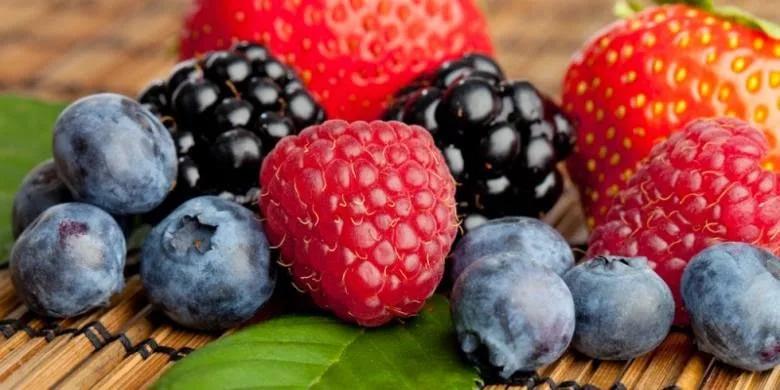
The Nutritional Powerhouses
One of the reasons berries are so effective for weight loss is their stellar nutritional profile. These fruits are packed with antioxidants, fiber, vitamins, and minerals while being very low in calories.
Antioxidants help combat oxidative stress and inflammation, two factors that can make losing weight more difficult. Berries contain flavonoids like anthocyanins that give them their vivid coloration. Studies show anthocyanins support weight loss by altering how fat cells work and reducing adipose tissue growth. The anthocyanins in berries help fat cells burn energy instead of storing it. They also limit the production of new fat cells. This results in less body fat accumulation over time when berries are consumed regularly.
Berries are also rich in vitamin C, which aids the absorption of fat-burning catechins found in many fruits. Catechins are natural antioxidants that help boost metabolism and break down fat. But for the catechins to be fully utilized by the body, sufficient vitamin C intake is crucial. The combination of catechins and vitamin C makes berries a one-two punch against excess fat storage.
In addition, berries are low energy-density foods, meaning they provide few calories relative to their size and volume. This is attributed to their high water and fiber content, which adds bulk without calories. Low energy-density foods are useful for weight control because you can consume satisfying portions without overdoing it on calories. Berries provide volume and sweetness with minimal caloric impact.
Berries and Weight Management
The fiber content of berries is another reason they excel at weight control. Berries like raspberries and blackberries provide a substantial amount of fiber per serving.
Fiber promotes satiety by slowing digestion and regulating blood sugar. This means you feel fuller for longer after eating berries, reducing the urge to snack between meals. Fiber also helps stabilize blood sugar, preventing the energy crashes that lead to sugar cravings.
Soluble fiber forms a gel-like consistency when mixed with water. This delays stomach emptying and digestion so you stay satisfied longer after eating. Berries happen to contain a lot of soluble fiber. This makes them an excellent snack for curbing appetite.
The fiber in berries can also limit the absorption of dietary fat and cholesterol. Some studies suggest viscous soluble fiber may bind to fat and cholesterol in the digestive tract, preventing their absorption. Berries can help minimize the amount of fat your body retains from high-fat meals.
Berries are also an excellent low-calorie substitute for higher sugar foods like cake, cookies, and chocolate. A cup of fresh strawberries or blueberries will satisfy your sweet tooth with just 50-60 calories. The sweetness comes from natural sugars instead of added sugars that pack empty calories. Choosing berries over sugary snacks is an easy way to cut calories from your diet.
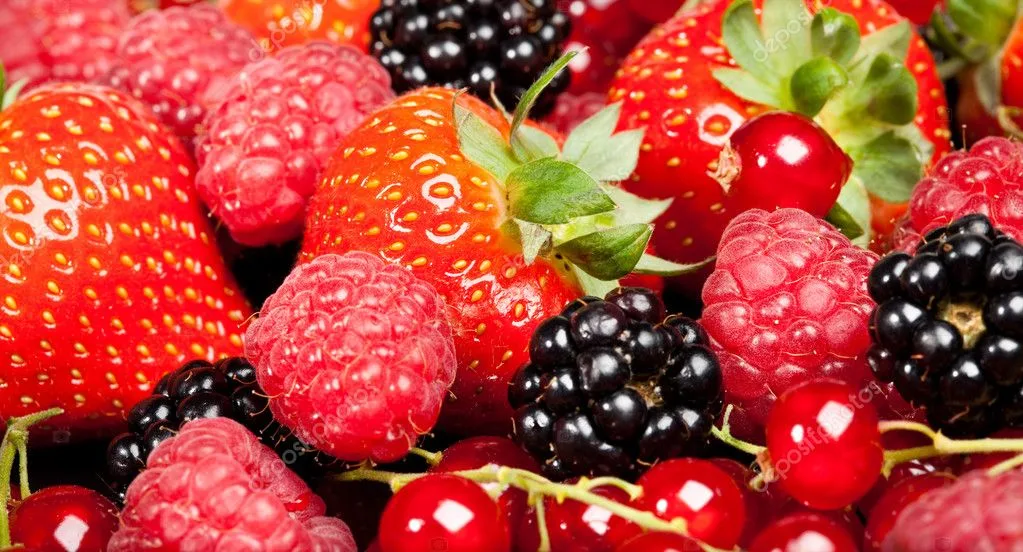
Berries as Metabolism Boosters
Emerging research indicates berries contain compounds that can boost your metabolism for more effective fat and weight loss.
Studies have found that polyphenols like anthocyanins and proanthocyanidins in berries increase thermogenesis. Thermogenesis is the process by which your body generates heat by burning calories. The polyphenols help activate proteins and enzymes involved in fat oxidation. This revs up calorie burn, resulting in more energy expenditure throughout the day.
In one study, participants were given a blueberry supplement for 6 weeks. The researchers observed a 5% increase in resting metabolic rate in the blueberry group compared to placebo. The metabolic boost from blueberries could equate to extra calories burned daily.
Berries may also activate brown adipose tissue (BAT), which are fat cells specialized in generating body heat through thermogenesis. BAT helps burn calories when activated, so berries essentially stoke your internal calorie-burning furnace. Animal research found berries high in polyphenols were able to increase both the amount and activity of BAT. More active BAT ramps up daily energy expenditure, driving enhanced fat burning.
The antioxidants in berries can also inhibit fat formation and accumulation. In particular, anthocyanins have been shown to interrupt the growth and proliferation of new fat cells. This prevents excessive expansion and multiplication of fat cells, reducing body fat.
Berry Varieties for Weight Loss
While all berries confer benefits, some stand out when it comes to losing weight. Let’s compare a few of the top choices:
- Strawberries – One of the most popular berries, strawberries are loaded with vitamin C and polyphenols. Animal studies found strawberry extract prevented weight gain even with a high-fat diet. The fiber and polyphenols promote satiety and fat burning. Strawberries are also very low in sugar compared to other fruit choices.
- Raspberries – With their robust fiber content of 8 grams per cup, raspberries excel at appetite control. Their significant polyphenol content also provides metabolism-boosting thermogenesis. While small, raspberries contain a compound called raspberry ketone that may also boost metabolism and reduce fat.
- Blueberries – Rich in polyphenols, blueberries curb oxidative stress and improve insulin sensitivity. Since chronically high insulin can lead to weight gain, blueberries help restore balance. The polyphenols may also turn white fat cells into calorie-burning beige and brown fat. Research also shows blueberries can alter genes involved in fat burning while suppressing genes that promote fat storage.
- Blackberries – With sky-high antioxidant levels, blackberries fight inflammation that can derail weight loss. Their fiber content supports satiety, and ellagic acid has been shown to reduce fat cell formation and growth. One study gave obese rats blackberry extract for 6 weeks, resulting in significantly less visceral abdominal fat.
- Cranberries – Tart cranberries offer antioxidants like proanthocyanidins that improve blood sugar regulation. Preventing blood sugar spikes can minimize fat storage. Cranberries also contain ursolic acid which curbs fat gains in mice fed high-fat diets. Dried cranberries make a portable, low-sugar berry snack.
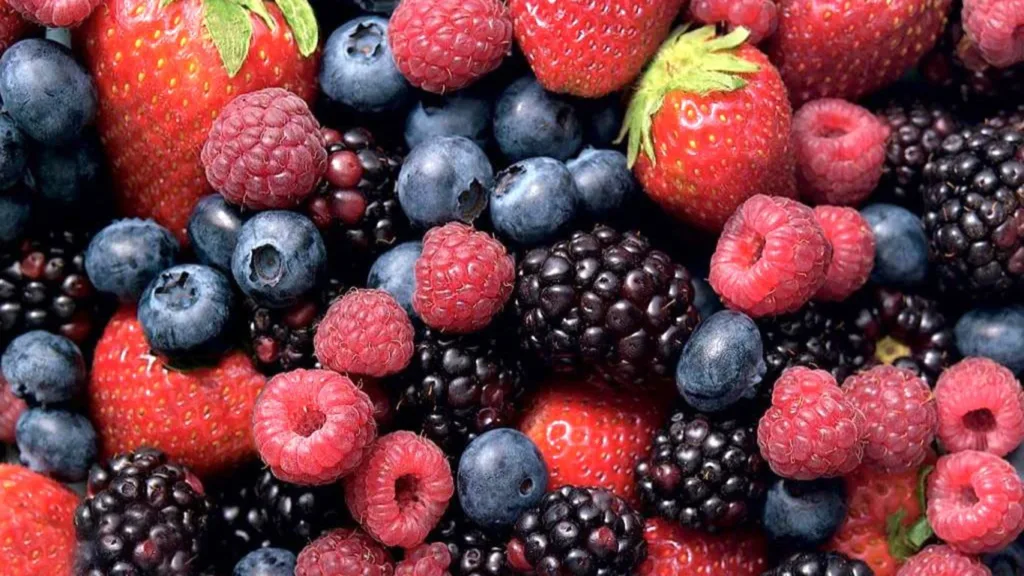
Incorporating Berries into Your Diet
Here are some creative ways to pump more berries into your daily diet:
- Make a nourishing berry smoothie for breakfast. Blend Greek yogurt, milk/nut milk, chia seeds, and a cup of mixed berries. The protein and fiber keep you full while the berries provide antioxidants to start your day off right. Sweeten if desired with honey or stevia.
- Top oatmeal, yogurt or cottage cheese with fresh berries and slivered almonds for fiber, antioxidants, and healthy fats. This makes a balanced breakfast or snack with carbs, protein, and good fats.
- Swap sugary jams for all-fruit spread with crushed berries mixed in. Spread on whole grain toast or English muffins for a more nutritious start to your day. The extra fiber keeps blood sugar stable after eating the carbs.
- Mix berries into green salads. The sweetness balances salad greens while the juice makes a nice dressing. Berries add fiber, vitamins, minerals, and antioxidants to an otherwise nutritionally-lacking salad.
- Enjoy chia pudding made with chia seeds, milk, and mixed berries for breakfast or dessert. The fiber and protein keep you satiated for hours.
- Blend berries into hummus, nut butters, or seed spreads for a sweet kick. Spread on crackers, apples, or celery for a healthy snack. The natural sugars satisfy your sweet tooth.
- Make berry kebabs by skewering blackberries, raspberries, blueberries, and sliced strawberries. Enjoy as a fun, portable snack. The burst of sweetness curbs sugar cravings.
- Freeze berries and enjoy as a cool treat on hot days. The icy texture satisfies like sorbet but without the added sugar. The frozen berries also work well in smoothies.
Berry-Infused Drinks for Weight Loss
Staying hydrated is critical for weight loss, and berries provide a refreshing way to flavor your beverages with antioxidants and phytonutrients. Some tasty options include:
- Berry smoothies – Blend berries, yogurt, milk/nut milk, spinach or kale, and chia seeds for a filling, nutrient-packed drink. Enjoy for breakfast or as a snack. The balance of protein, fiber, and good carbs keeps you satisfied for hours after sipping this beverage. Avoid sugary juice, ice cream or sherbets as mix-ins.
- Berry spa water – Add crushed berries and sliced citrus fruits like grapefruit or lemon to water. Let infuse overnight or 1-2 hours minimum. The berries infuse delightful flavor and sweetness without calories or artificial ingredients. Sip this fruity water throughout the day to stay hydrated in a healthy, satisfying way.
- Iced berry tea – Brew your favorite unsweetened tea, then chill and mix with frozen berries. Enjoy this sparking berry tea instead of sugar-laden sodas or bottled teas. The antioxidants in berries provide a nutritional boost missing from many beverages.
- Berry-infused water – Let berries soak in water overnight then enjoy the vitaminy water throughout the next day. Try different berry combos like blueberry-mint or strawberry-lime. This provides an antioxidant boost to keep you hydrated and refreshed.
Berries and Exercise
Incorporating berries into your exercise routine provides pre- and post-workout benefits:
- Pre-workout fuel – Eat Greek yogurt with berries and granola 60-90 minutes before your workout. The carbs provide energy while the berries supply antioxidants to counter the oxidative stress of exercise. Protein and fiber balance the meal, resulting in stable energy levels during your sweat session.
- Post-workout recovery – Blend a smoothie with protein powder, milk/nut milk, spinach, and mixed berries. The protein helps repair exercise-induced muscle damage while the berries reduce inflammation and replenish nutrients lost in sweat. Potassium in berries also aids rehydration after an intense workout.
- Hydration – Make berry spa water to sip during your workout. The electrolytes and antioxidants in berries will help keep you hydrated. Alternating water and berry water ensures you get enough fluid to power through high-intensity training.
- Muscle relief – Enjoy a berry parfait after your workout. The protein helps rebuild muscle tissues while the antioxidants reduce exercise soreness and inflammation. Pair berries with Greek yogurt or cottage cheese and a sprinkle of anti-inflammatory cinnamon or turmeric.
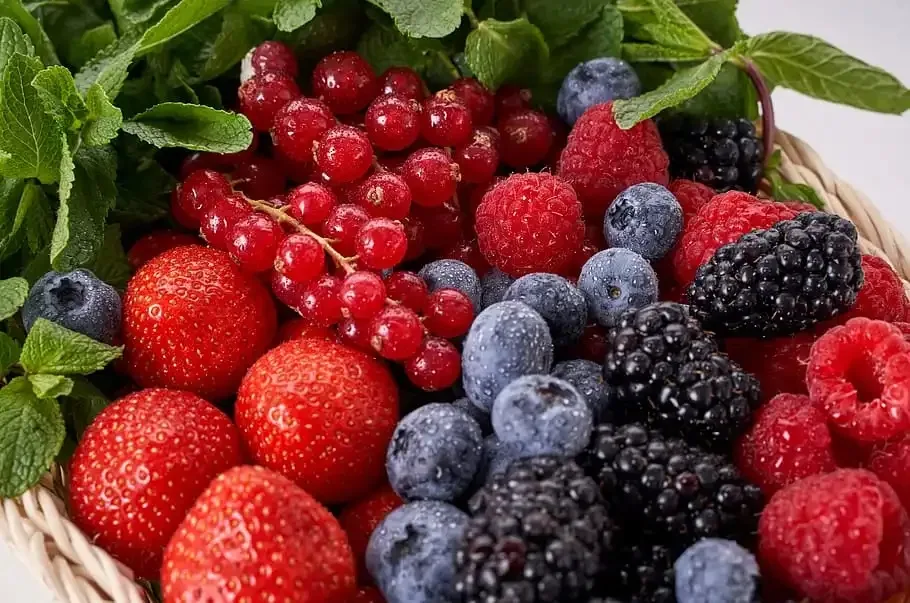
Berries and Long-Term Health
Beyond weight management, regularly eating berries has been tied to reduced risks of chronic illnesses like heart disease, diabetes, and even certain cancers. Their antioxidant and anti-inflammatory effects help prevent disease development and progression.
The anthocyanins that give berries their rich hues help relax blood vessels and improve circulation. One study found consuming blueberries daily helps lower blood pressure and arterial stiffness. The vasodilating effects of berry anthocyanins promote cardiovascular health.
Flavonoids called anthocyanidins found abundantly in berries demonstrate antidiabetic effects. They improve insulin response, enhance glucose uptake in tissues, and lower markers of inflammation linked to diabetes development. Consistently consuming berries has been shown to reduce type 2 diabetes risk.
Berries are also packed with ellagic acid, an antioxidant with anti-cancer abilities. Ellagic acid triggers cancer cell death, restricts tumor growth, and prevents DNA mutation that leads to cancer. Berries may play a protective role against breast, colon, prostate, and skin cancers.
The fiber, vitamins, minerals and phytochemicals in berries support overall health, allowing you to age gracefully and actively. By keeping your body energized and free of disease, berry intake enables an active lifestyle crucial for sustaining long-term weight and health.
The Sweet Conclusion: Berries for Weight Loss and Overall Health
While tiny, berries pack a serious punch when it comes to enhancing weight loss and wellness. With their powerhouse nutrient profile, metabolism-stoking effects, and delicious versatility, it’s easy to enjoy berries every single day. Just a daily cup of mixed berries will take your health goals to the next level.
Focus on buying organic or pesticide-free berries whenever possible. Store them in the fridge and be mindful not to wash until ready to eat to preserve freshness.
We hope this post has inspired you to embrace berries as a tool for successful, healthy weight loss. Thank you for joining us on this berry bliss journey. Be sure to subscribe to our free newsletter using the form below for regular nutrition, health and wellness content delivered to your inbox. You can also explore other posts on our site covering all aspects of food, fitness, and healthy living. Wishing you the all best on your path to weight loss and optimal health!
Thank you for reading this post, don't forget to subscribe to our free newsletter
!
